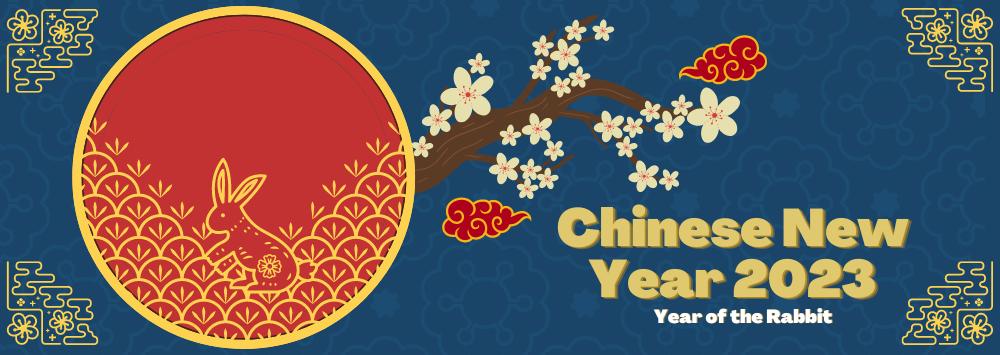
Dr Penny Ding, deputy director of the University of Liverpool Confucius Institute, describes Chinese New Year traditions, and explains the significance of the Year of the Rabbit.
The Historical Significance of Chinese New Year
Chinese New Year, referred to as the Spring Festival (春节) in China, falls on Sunday 22nd January this year. The festival is one of the most important holidays in China, and can be dated back even further than the Qin Dynasty (221BC). The first written evidence of Chinese people celebrating the New Year comes from the Han Dynasty (202BC - 220 AD), a time period when other important Chinese festivals, like the Mid-Autumn Festival and the Dragon Boat Festival, also originated.
The Han Dynasty is famous for its long reign and is considered as one of the most successful imperial dynasties in Chinese history in terms of political, economic, social, cultural and technological development. During this period, the Silk Road was established; paper was invented; social and legal reforms were realised; the first seismoscope of the world was invented; the first armillary sphere was invented; ship design and map making were improved, and new agricultural inventions transformed farming. Culturally, the originally distinctive regional cultures of the Qin, Chu, Yan, Han, Zhao, Wei, and Qi Kingdoms were also assimilated and evolved into a more uniformed Han culture. This included the formalisation of the festivals like the Spring Festival. Han culture became the dominant Chinese culture and, even today, the Han ethnicity is by far the largest, accounting for over 90% of the population in Mainland China.
The Year of the Rabbit
In 2023, we welcome the Year of the Water Rabbit (水兔年). The Year of the Water Rabbit occurs every 60 years, in a cycle that runs through gold(金), wood (木), water (水), fire(火), and earth (土) signs. The last Year of the Water Rabbit was in 1963, while the next will be in 2083!
Famous People born in the Chinese Year of the Rabbit
Many famous and talented people in all fields were born in the Year of the Rabbit. Some names of “famous rabbits” that you might be familiar with are given below
Sports - Lionel Messi, David Beckham, Novak Djokovic, Michael Jordan, and Tiger Woods.
Music- Kendrick Lamar, Frank Sinatra, Marvin Gaye, Whitney Houston, and Edith Piaf
Film - Orson Welles, Ingrid Bergman, Kate Winslet, Angelina Jolie, and Brad Pitt
Literature - George C. Scott, George Orwell, Gabriel Garcia Marquez, Margaret Atwood, and Seamus Heaney
Historical Figures - Wolfgang Amadeus Mozart, Julius Caesar, Albert Einstein, Queen Victoria, and Adam Smith.
What are the important dates you will need to remember about Chinese Spring Festival?
The celebrations of Spring Festival last for three weeks, with the main celebrations and activities over four important days beginning one week before Chinese New Year and finishing two weeks after Spring Festival.
Kitchen God's Day - Saturday 14th January 2023
One week before Chinese New Year, on the 23rd day of the 12th month of the lunar calendar, families will worship the Kitchen God because, according to mythology, the Kitchen God reports every household’s good and bad deeds to the Jade Emperor. To get a good report, it is a custom to eat sweet and sticky melon-shaped candies as a treat.
Chinese New Year's Eve - Saturday 21st January 2023
The final day of the 12th month of the Lunar Calendar is one of the most important days of the New Year celebration. In the afternoon, all the members of the family come home for a special New Year’s Eve dinner, which traditionally includes fish, chicken, and dumplings as a symbol of abundance and good fortune.
In the evening, most families spend time eating, drinking, and watching the Chinese New Year Spring Festival Gala on TV. At midnight, fireworks are set off to welcome the arrival of the new year. This year, Chinese New Year’s Eve falls on Saturday 21st January 2023. So, if you want to celebrate, make sure you eat fish, chicken, and dumplings!
Chinese New Year's Day - Sunday 22nd January 2023
Falling on the first day of the first month in the Lunar calendar, Chinese New Year’s Day is a time for setting the right tone for the year that will follow. Breakfast on New Year’s Day can start very early, even before 6 am. Families in the north of China have dumplings for breakfast, and families in the south eat glutinous rice dumplings (元宵 yuan xiao). After breakfast, families set off fireworks before their family relatives, friends and colleagues come to visit. The older people of the family often stay at home and the younger generation will go around and pay new year visit to families and friends.
Young children often receive gifts of red envelopes (红包 hong bao) containing money from their older relatives.
Lantern Festival - Sunday 5th February 2023
Two weeks after Chinese New Year, on the 15th day of the first month of the Lunar calendar is the Lantern Festival, also called the Rice Dumplings Festival. The day is filled with colourful and boisterous activities on the streets including lion dancing, dragon dancing, stilt walking, waist drum dancing, and sailing a flower-decorated boat on land with its paddlers doing comic performances. In the evening, the streets, lanes, public gardens, bridges and ponds which are already decorated with colourful lanterns are all lit up.
Eating rice dumplings is an important tradition, and the round shape of the rice dumplings symbolizes people’s wish for reunion and happiness. The popular fillings include peanuts, black sesame seeds, dates paste and red bean paste.
The University of Liverpool Confucius Institute (LCI) wishes all our colleagues, friends, students, and those in our wider communities of Liverpool, the Merseyside Region and beyond, a very happy, healthy and safe Chinese New Year of the Rabbit. May it bring you the best of luck, good health, good fortune and prosperity. 兔年大吉,身体健康,恭喜发财,万事如意!
You can find out more about the Liverpool Confucius Institute here.